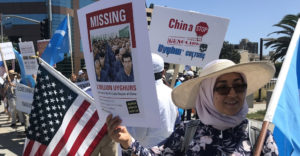The Uyghur Human Rights Project (UHRP) has reissued an open letter to governments, along with 29 genocide and atrocity prevention organizations from seven countries, and 21 senior experts, reiterating our grave concern that crimes against humanity and genocide are taking place against Uyghurs in East Turkistan.
“Uyghurs have now suffered unspeakable brutality for four years,” said Omer Kanat, UHRP Executive Director. “Systematic atrocity crimes began in 2017. How long will it take for UN member states to recognize these crimes and take action?”
Ellen Kennedy, Director of World Without Genocide, said “We urge an end to these human rights violations; the restoration and protection of Uyghurs’ safety and security; and legal investigations of those responsible for perpetrating these crimes.”
The original letter, supported by 22 genocide and atrocity prevention organizations and 16 senior experts from five countries, states that “The international community has the responsibility to respond to these crimes and protect Uyghurs and other Turkic peoples through diplomatic, humanitarian and other peaceful means.”
The letter also calls on governments to appoint a UN Commission of Inquiry to investigate the abuses, to implement commitments on atrocity and genocide prevention through bilateral and multilateral diplomacy, and independently investigate and make appropriate legal determinations regarding the situation.
Since the original publication of the open letter in September 2020, there have been growing calls to formally investigate the situation and to make appropriate determinations.
The Canadian Subcommittee on International Human Rights, in a news release on October 21, 2020, said that “Based on the evidence put forward during the Subcommittee hearings, both in 2018 and 2020, the Subcommittee is persuaded that the actions of the Chinese Communist Party constitute genocide as laid out in the Genocide Convention.” The subcommittee will soon submit a final report for consideration by the Foreign Affairs Committee of the Parliament of Canada.
The U.S. State Department is also reportedly reviewing the situation through its Office of Global Criminal Justice, which could trigger an official determination in the coming weeks or months. This followed the introduction of a bipartisan resolution on October 26 by Senators Robert Menendez and John Cornyn to designate the abuses as genocide.
Organizational signatories:
Aegis Trust
Asia-Pacific Centre for the Responsibility to Protect
Atrocity Forecasting Project
Coalition for Genocide Response
Cohen Center for Holocaust and Genocide Studies, Keene State College
European Centre for the Responsibility to Protect
Genocide Alert
Genocide Watch
Global Centre for the Responsibility to Protect
Holocaust Memorial Day Trust
Human Security Centre
Institute for the Study of Genocide
Institute for Genocide and Mass Atrocity Prevention (I-GMAP), Binghamton University
International Society for Civil Liberties and Rule of Law
Jacob Blaustein Institute for the Advancement of Human Rights
Jewish World Watch
The Jo Cox Foundation
Johannesburg Holocaust and Genocide Center
Master of Arts in Holocaust and Genocide Studies (MAHG), Stockton University
Montreal Institute for Genocide and Human Rights Studies
Operation Broken Silence
Raoul Wallenberg Centre for Human Rights
Remembering Srebrenica
René Cassin, the Jewish voice for human rights
Sentinel Project for Genocide Prevention
Society for Threatened Peoples
Protection Approaches
Uyghur Human Rights Project
Waging Peace
World Without Genocide
Individual Signatories:
Mehnaz M. Afridi, Director, Holocaust, Genocide, and Interfaith Education Center, Manhattan College
Jacqueline Bhabha, Professor of the Practice of Health and Human Rights, Harvard T.H. Chan School of Public Health
Daniel Feierstein, Director, Center for Studies on Genocide, National University of Tres de Febrero
Jocelyn Getgen, Director, Benjamin B. Ferencz Human Rights and Atrocity Prevention Clinic
Kevin Jon Heller, Professor of International Law and Security, University of Copenhagen (Centre for Military Studies) and Professor of Law, Australian National University.
Elisa von Joeden-Forgey, Associate Professor, Department of Holocaust and Genocide Studies, Keene State College
Zachary D. Kaufman, Associate Professor of Law and Political Science, University of Houston Law Center
Ben Kiernan, A. Whitney Griswold Professor of History, and Founding Director (1994-2015), Genocide Studies Program, Yale University
Tod Lindberg, Senior Fellow, Hudson Institute, and member of the United States Holocaust Memorial Museum’s Committee on Conscience
Peter McBride, Director, The Cohen Center for Holocaust and Genocide Studies, Keene State College
Christoph Meyer, Professor of European & International Politics, King’s College London
Dirk Moses, Frank Porter Graham Distinguished Professor of Global Human Rights History, University of North Carolina at Chapel Hill
Maxim A. Pensky, Co-Director, Institute for Genocide and Mass Atrocity Prevention, Binghamton University
Nadia M. Rubaii, Co-Director, Institute for Genocide and Mass Atrocity Prevention, Binghamton University
David Simon, Director, Yale Genocide Studies Program
Karen E. Smith, Professor of International Relations, London School of Economics and Political Science
Gregory Stanton, President, Genocide Watch
John Sturtz, Associate Professor, Education & Holocaust and Genocide Studies, Keene State College
Ernesto Verdeja, Kroc Institute for International Peace Studies, University of Notre Dame
James E. Waller, Cohen Professor of Holocaust & Genocide Studies, Keene State College
Andrew Woolford, Former President, International Association of Genocide Scholars



